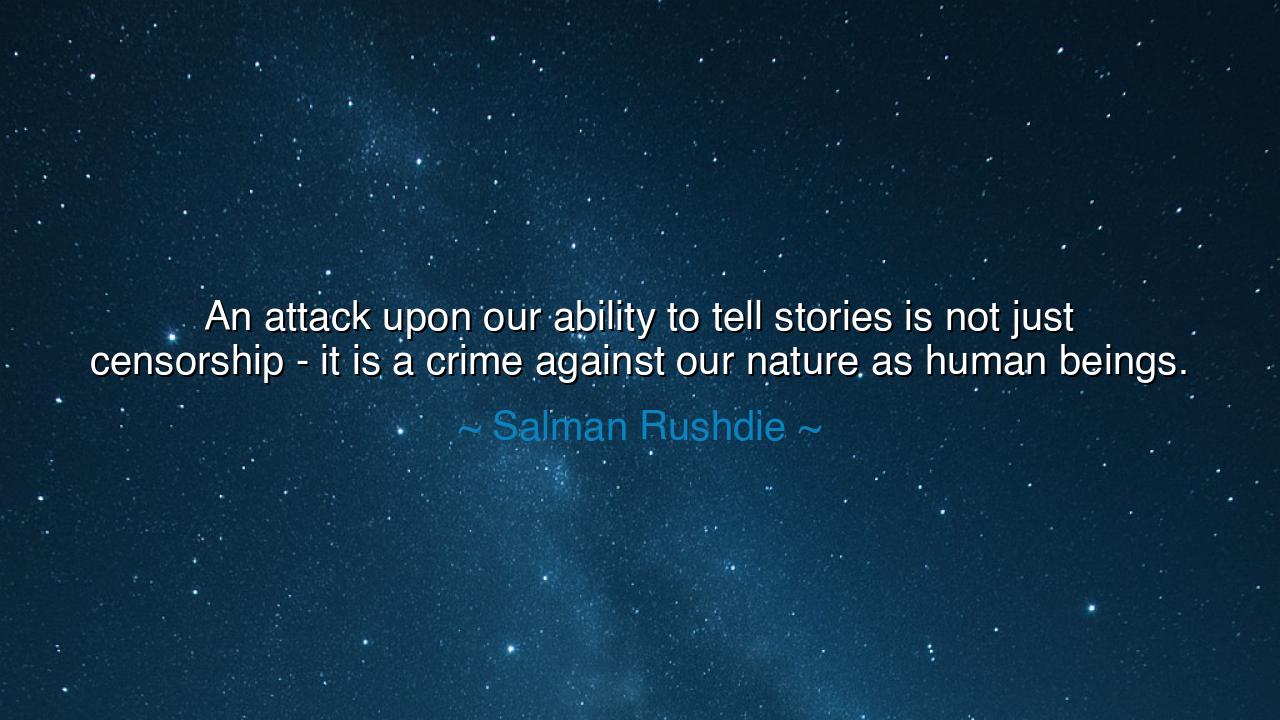
An attack upon our ability to tell stories is not just
An attack upon our ability to tell stories is not just censorship - it is a crime against our nature as human beings.






The words of Salman Rushdie, “An attack upon our ability to tell stories is not just censorship – it is a crime against our nature as human beings,” fall not as mere utterances, but as a cry that echoes across the corridors of time. For the power to tell stories is no small gift; it is the lifeblood of our kind, the golden thread binding generation to generation, memory to memory. To strike at this is not only to silence a tongue but to sever the very cords that tie us to our ancestors and to our unborn descendants.
Since the dawn of our days, before the chiseling of stone or the writing upon papyrus, mankind has survived by the telling of tales. Around fires, in caves, in temples and halls, the old passed their wisdom to the young in parables of beasts, heroes, and gods. To forbid this is not to forbid mere words—it is to forbid remembrance itself. Without story, man becomes like drifting sand: unanchored, unremembered, unmeaning. Thus Rushdie, with the pain of exile and the scars of attempted silence upon him, names such an attack a crime against our nature, for it seeks to make us something other than what we are.
Consider, children of time, the story of the poet Homer. His words, sung long before they were written, gave form to courage, to cunning, to loyalty, and to wrath. His tales bound together scattered tribes into one civilization that knew itself through story. Imagine if a tyrant had said: “These verses shall not be spoken.” Would Greece have risen? Would its heroes have endured in memory? Nay—it is in their telling, repeated like a heartbeat through ages, that they live still among us. Thus do we see that to strike down story is to strike down the roots of nations themselves.
Nor is this lesson found only in ancient times. Recall the burning of books in Nazi Germany, where volumes that bore Jewish thought, or ideas contrary to tyranny, were heaped into fire. The flame devoured pages, but it sought more than paper: it sought the spirit of free thought, the voices of the silenced, the memory of whole peoples. The act was not mere censorship, but an attempted annihilation of identity, a crime upon humanity’s very essence. Yet still those voices whisper through survivors, through secret copies, through remembrance—proving that story cannot be slain, even by fire.
For stories are more than entertainment. They are the weapons of the powerless, the medicine of the wounded, the wings of the dreamer. The slave sang songs of freedom, weaving hope into chains. The exile carried in his tongue the memory of his homeland, preserving it across seas. The oppressed whispered tales of justice in darkened rooms, planting seeds for revolutions yet to bloom. To steal this from humankind is to steal the very breath from our collective soul.
What then shall be the lesson for you who hear these words? It is this: guard with your life the sacred right to speak, to write, to tell stories. Do not turn away when voices are silenced, for the silence of one is the impoverishment of all. Defend not only your own tale but also the tale of your neighbor, even when it is not your own tongue or creed. To honor story is to honor humanity itself.
And what action shall you take in your own life? Speak your truth without fear. Listen with reverence to the truths of others. Write, sing, and remember. Pass on to your children not only facts but stories—stories of your ancestors, stories of struggle, of triumph, of folly, and of love. Stand watch against those who would burn books, ban voices, or stifle thought, for in resisting them you protect not only freedom but the very soul of mankind.
For the day may come when you, too, will need the strength of a story to endure the night. And if you have kept alive the flame of storytelling, you will find that even in darkness, the human voice, trembling but unbroken, can still declare: “We are human, for we tell our tales. And while we tell them, we shall not be destroyed.”






AAdministratorAdministrator
Welcome, honored guests. Please leave a comment, we will respond soon